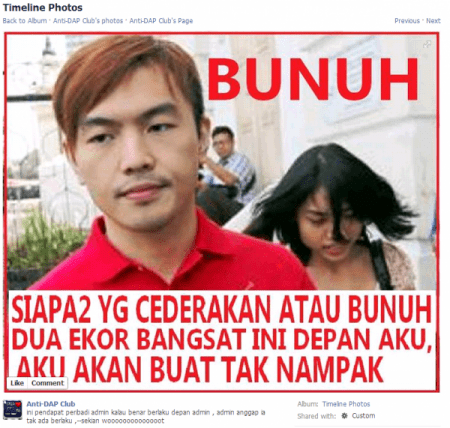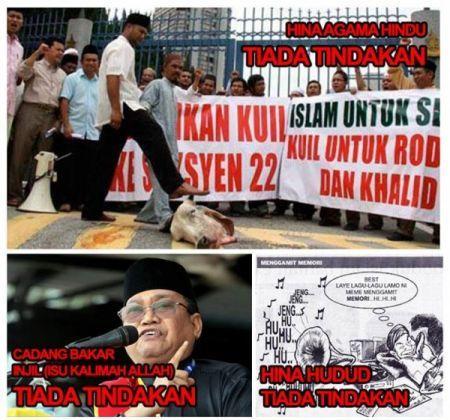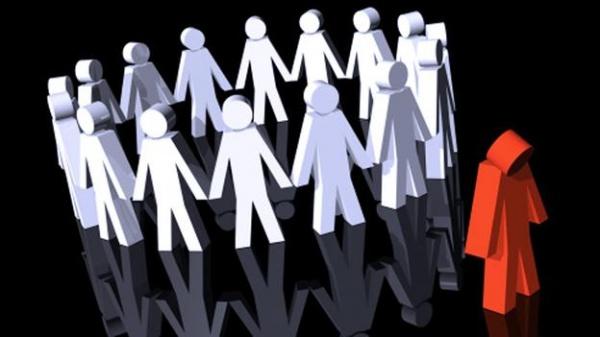Vivegavalan V. Valu has hope for Malaysia in its quest for racial harmony and acceptance.
Disclaimer: The graphic images below are not the works of the author, neither do they represent the stance of the author. They have been reproduced purely for the purposes of illustration and in the hope that it provides some context as to the true purpose of the article.
As the saying goes, a picture speaks a thousand words and the cold hard truth is that if our forefathers were still alive today, they would cringe, devastated that their dreams which had cost many a life now lay wasted at the feet of the current generation of Malaysians. One could almost be forgiven for not recognising Malaysia in all her grandeur and beauty, for today it is no longer the country many of us grew up in. This continued decline of a society once built on the values of tolerance, understanding and respect is worrying to say the least. Today, the ordinary Malaysian looks over their shoulders with contempt, doubt and hatred towards another race or religion. The question then is what exactly happened? How did we, peace-loving citizens of a country formed on the consensus of racial harmony and religious tolerance, come to this?
To be able to understand our current quandary, we must first address our history. The Malays can be traced back to the Indo-Siamese lineage and were the earliest explorers and traders to settle in Malaysia. For the sole purpose of economic construct, the Indians and Chinese were brought in to work for and service rubber plantations and mining of tin ore, respectively. Sun Tzu’s Art of War sheds some light as to the methodology employed by the British whereby cultural integration was avoided and within the community, a chain of command established to divide and rule. A distinct pattern begins to emerge, not to dissimilar to what Marxism stood against. Several prominent Marxists describe the theory as the appreciation of class conflict within the capitalist mechanist, whereby the privatisation of surplus product to create a value for profit is controlled by the bourgeoisie and the human capital subservient to them or the proletariat.
This creates unrests between the two antagonistic classes, thus culminating in a social revolution. While Marxism employs its theory in absolutes, discarding factors such as race as its sole purpose is the destruction of the capitalist market, Malaysia operates a somehow hybrid form whereby the initial two classes were further expanded and amalgamated with a person’s race. This meant that the situation eventually presented itself when it mattered not that a battle was between the rich and poor, so long as the rich was part of one community, even if it meant that the rest continued to suffer. This is what we have come to know today as race politics.
The British when granting independence in haste sought to assimilate the classes, making it a requirement that the three major races were united in harmony and that they collectively rule the country. The problem here is that owing to the fact that there was never in fact a cultural overlap as a precursor, no one predicted the underlying interests and needs of the varying communities. Furthermore, the fact that there was an established majority and minority group of races, disparity in terms of power and economic benefits would certainly lead to a clash of interest. May 13, anyone?
Now, we are all well versed with the apartheid regime in South Africa whereby the ruling party enacted into legislation the so-called ‘white supremacy’ and curtailed the rights of the blacks. The then Prime Minister of Malaysia, Tun Dr. Mahathir Mohammad was a staunch critic of the regime, and Malaysia along with ASEAN was one of the biggest players in the push for reform. However, what ensued in our own backyard immediately after the May 13 incident was in fact not too different to the very issue we strongly opposed. The New Economic Policy of 1970 was deemed to be the answer to our problems then, but little did we know that its repercussions would not only destroy the racial harmony of the country but pave the way to a new generation of Malaysians who no longer considered each other as brothers and sisters but who rather employed an ‘us v them’ mentality.

Whatever has been said and done about the causes of the May 13 riots, it is clear that the underlying problem was poverty and socio-economic disparity. Thus, the overriding objective of the NEP was to be a move towards national unity, coupled with a strategy to accelerate economic growth and to ensure a holistic development of the nation. However, what was supposed to be the answer to our problems evolved into our biggest nightmare. While the NEP has had its fair share of success, its biggest flaw was the rift it created between the three main races owing to its affirmative action, distortion of the economic pie in terms of the private and public sector, education quota and most importantly, what many call today special privileges and the unquestionable rights of the Bumiputera.
The problem, contrary to what many think, isn’t in fact the special rights accorded to one class, but the denial of rights of another. Here we see a form of institutionalised oppression that has led us to not only mistrust but also dislike of other races. This should have been evident enough to the politicians then when even within a family, favouritism causes siblings to often be envious among each other, which then naturally leads up to a clash. A recent paper published for the United States Committee on Foreign Affairs depicts a closer look as to how institutionalised racism and religious freedom has affected Malaysia as a whole. The root of the problem is prescribed to be Article 153 of the Federal Constitution, which outlines the direction of Malay supremacy. However, the discourse holds that what is in normal context termed racism is in fact the outcome of a failed system and an incompetent bureaucracy.
The politics of the country is such that we have inadvertently taken the whole divide-and-rule concept to a whole new level. Malaysia has successfully managed to create, literally, a class within a class, whereby the Malay elite continue to subjugate the rural workers, and the Indian and Chinese upper class who benefit directly from government transactions ignore the plight of their community and serve to fool the very people who trust them to protect their affairs. This leaves the oppressed, the poor and the minorities fighting not only against the system and state but also the upper class of their own community to whom they are shackled to and blinded by for being a member of their race.
Coming back to the present day, we are presented almost on monthly subscription doses of racial bigotry and religious intolerance. Who can forget the cow head incident, or the threat to burn bibles and the ‘Apa Lagi Cina Mahu’ farce? Recently of course is the whole ‘Alvivi’ fiasco which has caused rage among the Muslim community. While I absolutely abhor and denounce their actions, I take issue with the reaction generated and subsequent charges against them. There can be no grey areas for where the law is concerned and equality of standing in the course of justice has to be ensured if we are to attain consistency. The problem of course isn’t the reaction or lack of reaction from the ruling coalition but rather in which selective persecution is often the norm in particular where race is involved.

That a matter of blatant stupidity should be clamped down, that the bloggers should be denied bail and prosecuted with the full force of a threat to national security, is not only uncalled for but deeply troubling. It is even harder to swallow the Attorney-General’s reasoning of further provocation from the defendant when a simple silence order would have sufficed. Even as we speak, comparisons are made to the rape incident involving a grandfather who was allowed bail despite the severity of the allegations. If we are to transcend this path, what then of Ibrahim Ali and Zulkifli Nordin? In what legal spheres are the slanders committed not an act against national security and racist in nature? How is it that the same act, nay, a significantly lesser act committed by A is wrong whereas B is allowed full leeway without the fear of prosecution?
Here, we hit the crux of the matter in that Malaysians were never racists or religious zealots in nature. We have been moulded over decades to fear, despise and ultimately discard another solely by their race. The incumbent establishment has for political survival constructed a model of race politics that has enabled them to play us against each other, blinding us to their abuse of power, corruption and matters of actual importance. The facade that they have put up may have you believing in ideologies such as “Ketuanan Melayu” or “1Malaysia”, but the reality is that there is and has always been only them against us — the rich against the poor and the powerful against the powerless.
The sad position we find ourselves in now is that two children — yes, children, for their act is as mature — now find themselves prosecuted for a stupid act and find none in their defence, despite the fact that the state has infringed on their freedom of speech and continued its reliance on the Sedition Act for fear of being labelled a racist. In context, which Chinese would want another tirade from Utusan Malaysia? There can be no right or wrong so long as the system in place serves only selective justice. This issue will surely continue on and result in further aggravation, but we cannot afford to continue to fall deeper, to be fooled by the play of the political masters above.
This racial construct of Malaysia’s is too deeply entrenched to undergo a radical change in a short span of time, and although a Malaysian Malaysia remains the ideal, our best hope lies under the very earth we step on. The values held close by our forefathers, the ability to respect, love and cherish each other for our differences is what made us citizens of this country. There is no harm in trying to avoid drinking or eating in front of our Muslim brothers or sisters during Ramadan and neither is there any harm in calling out and protecting our non-Muslim family from being abused or threatened by a select few imbeciles who would rather see us crash than to co-exist together.
Should we lose sight of our roots permanently, I fear the future generations will never be able to see the Malaysia we have grown to love and would willingly die for. Is there hope? Yes. Are Malaysians naturally racist? No. We are peace-loving people who have been brought up together with our friends of varying races. It is within the power of each and every one of us to give in, to understand the grievances of one another and to stand united against the very institution put in place to divide us. We have done it for 56 years and I have an unshakeable faith that we will be able to come out of this again, stronger, together.
Featured image sourced from the BBC.


Excellent share, this is a really quality post. In underlying objects theory I’d like to write like this too. Taking time and real effort to make a good article. desert safari
Really impressive. I am aslo from Malaysia :D Pick Up Lines for girls only
On the basis of the race there should not be the discrimination as this is not the thoughtful and sounds well. You can avail essay writing in their assignments to make them error free and can get good marks in assignments.
A great article :)